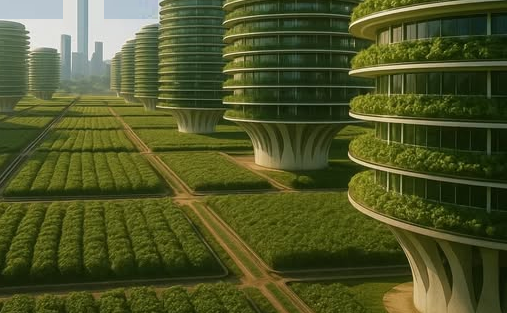China has reportedly launched a monumental initiative in sustainable agriculture with the unveiling of a vast, 1,000-acre vertical farming city concept, an unprecedented project that promises to fundamentally change how megacities are fed.
The massive, technology-driven complex utilizes stacked, climate-controlled farming towers, a model touted to produce an astonishing nine times more food than conventional farming while using up to 90% less water.
While details about the exact location of the full 1,000-acre development remain proprietary, the project appears to be the culmination of years of research and pilot programs across China, including the high-tech demonstration centers near Beijing and the ambitious “Sunqiao Urban Agricultural District” in Shanghai.
- Unmatched Efficiency: By growing crops hydroponically in enclosed, multi-tiered systems, the complex achieves year-round harvests, independent of weather, seasons, or soil quality. Initial reports indicate a massive yield increase, potentially up to nine times that of a similarly-sized conventional farm.
- Radical Water Conservation: The closed-loop hydroponic systems and precise climate control are projected to reduce water consumption by a remarkable 90% compared to traditional field cultivation, addressing China’s critical water scarcity issues.
- Urban Integration: The concept positions food production directly within or immediately adjacent to the urban population, drastically reducing the need for long-distance transport. This cuts down on logistics costs, carbon emissions, and ensures a fresher supply of produce.
- AI and Automation: The farms leverage cutting-edge technology, including intelligent sensors, automated planting and harvesting, and LED lighting systems optimized for different crop stages, which eliminates the need for pesticides and fertilizers.
Experts suggest this immense investment—representing one of the largest vertical farming projects in the world—is China’s strategic answer to urbanization, dwindling arable land, and the growing demand from its middle class for consistent, clean, and locally-sourced food.
The success of this 1,000-acre project could provide a blueprint for other nations struggling with food security and resource management, marking a pivotal step toward a more sustainable and resilient global food system.






